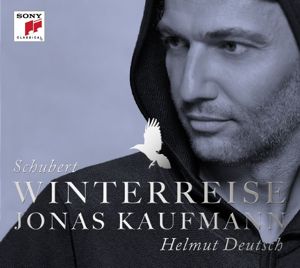|
|
|
|
|
|
|
|
|
International Record Review, April 2014 |
| John T. Hughes |
|
|
|
Schubert - Winterreise |
|
 Although
there are fewer recordings of Winterreise by tenors than by baritones, there
is always the question of whether another one of this cycle is needed,
whatever the voice. One answer might he a decisive 'no', whilst a second
could be that 'there is always room for more'. Specific to the disc at hand,
the response should be 'yes, for it will enable the listener to hear how
Jonas Kaufmann, so imposing and impressive in opera, tells the story of this
particular winter journey his way'. He certainly has his views, as one
appreciates on reading the conversation in the booklet in which Thomas Voigt
asks both the singer and his pianist Helmut Deutsch about how they interpret
the work: on one point they do not agree, but it is not one to affect their
performance. It refers to the final song. Although
there are fewer recordings of Winterreise by tenors than by baritones, there
is always the question of whether another one of this cycle is needed,
whatever the voice. One answer might he a decisive 'no', whilst a second
could be that 'there is always room for more'. Specific to the disc at hand,
the response should be 'yes, for it will enable the listener to hear how
Jonas Kaufmann, so imposing and impressive in opera, tells the story of this
particular winter journey his way'. He certainly has his views, as one
appreciates on reading the conversation in the booklet in which Thomas Voigt
asks both the singer and his pianist Helmut Deutsch about how they interpret
the work: on one point they do not agree, but it is not one to affect their
performance. It refers to the final song.
Deutsch questions whether
the hurdy-gurdy man (in 'Der Leiermann') accompanies the wanderer on his
journey, seeing it as a possibility rather than a certainty, whereas
Kaufmann states unequivocally: 'I don't see the hurdy-gurdy man as a
potential travelling companion but as a figure of the wanderer's
imagination: he's like a madman talking to a ghost of a dead man.' Of
course, there is also the more mundane meeting of the wanderer and a beggar
with a hurdy-gurdy, with no other-worldly connotations.
Kaufmann, as
anybody who has heard him in opera can confirm, has a wide range of colours
and shades in his voice: essential attributes for a successful singer of
Lieder and extremely important in telling the wanderer's account of his time
after leaving his beloved. Self-pity there may be in the wanderer, but the
descriptions of what he sees, both animate, like the crow in 'Die Krähe',
and inanimate, the signpost in 'Der Wegweiser', should be searing if the
singer is up to the mark in what has been described in print, The Record
Guide (Collins; 1955), as 'the greatest song-cycle ever composed'.
The present recording must be one of the most internalized interpretations
that I have heard: so much is sung in mezza voce. It would accord with
Kaufmann's view of the hurdy-gurdy man as existing in the wanderer's
imagination. Full voice is employed for contrast but in only two songs, the
shortest, 'Der stürmisch Morgen' and 'Mut!', does Kaufmann turn to that
fullness for the whole piece. After only two or three songs one realizes
that this wanderer sees no resolution to his despair. The inwardness with
which the two artists deliver 'Der Lindenbaum' gives way to weightier tones
for the cold winds of the fifth verse. Contrast comes also in 'Wasserflut',
begun very quietly. Similarly, in 'Auf dem Flusse' the full sound is held
back until the wanderer questions whether a raging torrent flows.
Kaufmann's restraint in 'Der greise Kopf' becomes almost speech in the
second stanza, while in 'Der Wegweiser' he all but whispers the ending.
Deutsch has been working well with the singer, adding some subtle rubato in
places. 'Irrlicht' is lightly done by both artists. In many quiet songs,
Kaufmann virtually turns his use of head-voice into an art form of its own.
I think that after listening to a performance of Winterreise one should
feel drained.'Das Wirtshaus' ('The Inn') always has an effect on me, for
this particular place of rest is a graveyard. A threatening tear is often
close when I hear the opening bars of this song, persuasively played here by
Deutsch. Kaufmann's quiet delivery of the text is eloquently done. As for
'Der Leiermann', Kaufmann sings it as though the wanderer is watching the
old hurdy-gurdy player from a distance, the question 'strange old man, shall
I go with you?' being one of those unspoken thoughts that we all have. For
Wolfgang Holzmair 'it is all over', which is how I read it too. We shall
never know what the poet, Wilhelm Müller, thought of the ending, nor whether
Schubert agreed with him, even if he was aware of Müller's ideas.
This performance by Kaufmann and Deutsch held my attention throughout: so
restrained, so despairing, so understated but well stated. Deutsch says in
the printed conversation that 'after a performance of Winterreise I can't
simply carry on as usual, either as an interpreter or as a listener'. The
recording is true to both performers, with no distorted acoustics. Named
after the famous producer, the August Everding Saal in Grünwald is
presumably a new venue. It is good that for once Sony Classical has supplied
the texts and English translations of the songs, adding to the desirability
of this latest recording of a powerful song cycle.
|
|
|
|
|
|
|
|
|
|
|
|
|
|
|
|
|
|
|